A New Song Read online
Page 2
“‘Hey,’” he read aloud from Dooley’s letter, “‘I have thought about it a lot and I would like to stay in Mitford and work for Avis this summer and make money to get a car and play softball with the Reds.
“‘I don’t want to go to the beach.
“‘Don’t be mad or upset or anything. I can live in the basement with Harley like you said, and we will be fine. Puny could maybe come and do the laundry or we could do stuff ourselves and eat in Wesley or at the Grill or Harley could cook.
“‘I will come down to that island for either Thanksgiving or Christmas like we talked about.
“‘Thanks for letting me go home from school with Jimmy Duncan, I am having a great time, he drives a Wrangler. His mom drives a Range Rover and his dad has a BMW 850. That’s what I would like to have. A Wrangler, I mean. I’ll get home before you leave, Mr. Duncan is driving me on his way to a big meeting. Say hey to Barnabas and Violet. Thanks for the money. Love, Dooley.’”
“Oh, well,” said his wife, looking disappointed. “I’m sure he wanted to be close to his friends. . . .”
“Right. And his brother and sister. . . .”
She sighed. “Pretty much what we expected.”
He felt disappointed, himself, that the boy wouldn’t be coming to Whitecap for the summer, but they’d given him a choice and the choice had been made. Besides, he learned a couple of years ago not to let Dooley Barlowe’s summer pursuits wreck his own enjoyment of that fleeting season.
It was the business about cars that concerned him. . . . Dooley had turned sixteen last February, and would hit Mitford in less than three days, packing a bona fide driver’s license.
“Knock, knock!” Emma Newland blew down the hall and into the study. “Don’t get up,” she said, commandeering the room. “You’ll never believe this!”
His former part-time church secretary, who had retired when he retired, had clearly been unable to let go of her old job. She made it her business to visit twice a week and help out for a couple of hours, whether he needed it or not.
“I do it for th’ Lord,” she had stated flatly, refusing any thanks. Though Cynthia usually fled the room when she arrived, he rather looked forward to Emma’s visits, and to the link she represented to Lord’s Chapel, which was now under the leadership of its own interim priest.
Emma stood with her hands on her hips and peered over her glasses. “Y’all won’t believe what I found on th’ Internet. Three guesses!”
“Excuse me!” said Cynthia, bolting from the sofa. “I’ll just bring you a lemonade, Emma, and get back to work. I’ve gobs of books to pack.”
“Guess!” Emma insisted, playing a game that he found both mindless and desperately aggravating.
“A recipe for mixing your own house paint?”
“Oh, please,” she said, looking disgusted. “You’re not trying.”
“The complete works of Fulgentius of Ruspe!”
“Who?”
“I give up,” he said, meaning it.
“I found another Mitford! It’s in England, and it has a church as old as mud, not to mention a castle!” She looked triumphant, as if she’d just squelched an invasion of Moors.
“Really? Terrific! I suppose it’s where those writing Mitfords came from—”
“No connection. They were from th’ Cotswolds, this place is up north somewhere. I had a stack of stuff I printed out, but Snickers sat on th’ whole bloomin’ mess after playin’ in the creek, and I have to print it out again.”
“Aha.”
“OK, guess what else!”
“Dadgummit, Emma. You know I hate this.”
She said what she always said. “It’s good for you, keeps your brain active.”
As far as she was concerned, he’d gone soft in the head since retiring six months ago.
“Just tell me and get it over with.”
“Oh, come on! Try at least one guess. Here’s a clue. It’s about the election in November.”
“Esther’s stepping down and Andrew Gregory’s going to run.”
She frowned. “How’d you know that?”
“I haven’t gone deaf and blind, for Pete’s sake. I do get around.”
“I suppose you also know,” said Emma, hoping he didn’t, “that the restaurant at Fernbank is openin’ the night before you leave.”
“Right. We’ve been invited.”
She thumped into the slipcovered wing chair and peered at him as if he were a beetle on a pin. Though she’d certainly never say such a thing, she believed he was existing in a kind of purgatory between the inarguable heaven of Lord’s Chapel and the hell of a strange parish in a strange place where the temperature was a hundred and five in the shade.
“Will you have a secretary down there?” she asked, suspicious.
“I don’t think so. Small parish, you know.”
“How small can it be?”
“Oh, fifty, sixty people.”
“I thought Bishop Cullen was your friend,” she sniffed. She’d never say so, but in her heart of hearts, she had hoped her boss of sixteen years would be given a big church in a big city, and make a come-back for himself. As it was, he trotted up the hill to Hope House and the hospital every livelong morning, appearing so cheerful about the whole thing that she recognized it at once as a cover-up.
Cynthia returned with a glass of lemonade and a plate of shortbread, which she put on the table next to Emma. “I’ll be in the studio if anyone needs me. With all the books we’re taking, we may sink the island!”
“A regular Atlantis,” said Father Tim.
“Speakin’ of books,” Emma said to his wife, “are you doin’ a new one?”
“Not if I can help it!”
He laughed as Cynthia trotted down the hall. “She usually can’t help it.” He expected a new children’s book to break forth from his energetic wife any day now. Indeed, didn’t she have a history of starting one when life was upside down and backward?
Emma munched on a piece of shortbread, showering crumbs in her lap. “Do you have those letters ready for me to do on th’ computer?”
“Not quite. I wasn’t expecting you ’til in the morning.”
“I’m coming in th’ morning, I just wanted to run by and tell you all th’ late-breakin’ news. But,” she said, arching one eyebrow, “I haven’t told you everything, I saved th’ best ’til last.”
His dog wandered into the study and crashed at his master’s feet, panting.
“If you say you already know this, I’ll never tell you another thing as long as I live. On my way here, I saw Mule Skinner, he said he’s finally rented your house.”
She drew herself up, pleased, and gulped the lemonade.
“Terrific! Great timing!” He might have done a jig.
“He said there hadn’t been time to call you, he’ll call you tonight, but it’s not a family with kids like Cynthia wanted.”
“Oh, well . . .” He was thrilled that someone had finally stepped forward to occupy the rectory. He and Harley had worked hard over the last few months to make it a strong rental property, putting new vinyl flooring in the kitchen, replacing the stair runners, installing a new toilet in the master bath and a new threshold at the front door . . . the list had been endless. And costly.
“It’s a woman.”
“I can’t imagine what one person would want with all that house to rattle around in.”
“How quickly you forget! You certainly rattled around in there for a hundred years.”
“True. Well. I’ll get the whole story from Mule.”
“He said she didn’t mind a bit that Harley would be livin’ in the basement, she just wanted to know if he plays loud rock music.”
Emma rattled the ice in her glass, gulped the last draught, and got up to leave. “Before I forget, you won’t believe what else I found on th’ Internet—church bulletins! You ought to read some of th’ foolishness they put out there for God an’ everybody to see.”
She fished a piece of paper from her hand
bag. “‘Next Sunday,’” she read, “‘a special collection will be taken to defray the cost of a new carpet. All those wishin’ to do somethin’ on the new carpet will come forward and do so.’”
He hooted with laughter.
“How ’bout this number: ‘Don’t let worry kill you, let th’ church help.’”
He threw his head back and laughed some more. Emma’s life in cyberspace definitely had an upside.
“By th’ way, are you takin’ Barnabas down there?” She enunciated “down there” as if it were a region beneath the crust of the earth.
“We are.”
“I don’t know how you could do that to an animal. Look at all that fur, enough to stuff a mattress.”
Barnabas yawned hugely and thumped his tail on the floor.
“You won’t even be able to see those horrible sandspurs that will jump in there by th’ hundreds, not to mention lodge in his paws.”
Emma waited for an argument, a rationale—something. Did he have no conscience? “And th’ heat down there, you’ll have to shave ’im bald.”
Father Tim strolled across the room to walk her to the door. “Thanks for coming, Emma. Tell Harold hello. I’ll see you in the morning.”
His unofficial secretary stumped down the hallway and he followed.
He was holding the front door open and biting his tongue when she turned and looked at him. Her eyes were suddenly red and filled with tears.
“I’ll miss you!” she blurted.
“You will?”
She hurried down the front steps, sniffing, searching her bag for a Hardee’s napkin she knew was in there someplace.
He felt stricken. “Emma! We’ll . . . we’ll have jelly doughnuts in the morning!”
“I’ll have jelly doughnuts, you’ll have dry toast! We don’t want to ship you down there in a coma!”
She got in her car at the curb, slammed the door, gunned the motor, and roared up Wisteria Lane.
For one fleeting moment, he’d completely forgotten his blasted diabetes.
“I’m out of here,” he said, kissing his wife.
“Get him to leave something for the island breezes to flow through, darling. Don’t let him cut it all off.”
“You always say that.”
“Yes, well, you come home looking like a skinned rabbit. I don’t know what Joe Ivey does to you.”
Considering what Fancy Skinner had done to him time and time again, Joe Ivey could do anything he wanted.
“Leavin’ us, are you?” Joe ran a comb through the hair over Father Tim’s left ear and snipped.
“Afraid so.”
“Leavin’ us in th’ lurch is more like it.”
“Now, Joe. Did I preach to you when you went off to Graceland and left me high and dry?”
Joe cackled. “Thank God I come to m’ senses and quit that fool job. An’ in th’ nick of time, too. I’m finally about t’ clean up what Fancy Skinner done to people’s heads around here, which in your case looked like she lowered your ears a foot an’ a half.”
“My wife says don’t cut it too short.”
“If I listened to what wives say, I’d of been out of business forty years ago. Do you know how hot it gits down there?”
If he’d been asked that once, he’d been asked it a thousand times. There was hardly anything mountain people despised more than a “hot” place.
“I’m an old Mississippi boy, you know.”
“An th’ mosquitos . . . !” Joe whistled. “Man alive!”
“Right there,” he said, as Joe started working around his collar. “Just clean it up a little right there, don’t cut it—”
Joe proceeded to cut it. Oh, well. Joe Ivey had always done exactly as he pleased with Father Tim’s hair, just like Fancy Skinner. What was the matter with people who serviced hair, anyway? He had never, in all his years, been able to figure it out.
“I hear it’s a ten-hour trot t’ get there,” said Joe, clearly fixated on the inconvenience of it all.
“Closer to twelve, if you stop for gas and lunch.”
“You could go t’ New York City in less’n that. Prob’ly run up an’ back.”
“There’s a thought.”
Joe trimmed around his customer’s right ear. “I’m gettin’ t’ where I’d like t’ talk . . .”—Joe cleared his throat—“about what happened up at Graceland.”
“Aha.”
“I ain’t told this to a soul, not even Winnie.”
There was a long pause.
Father Tim waited, inhaling the fragrance from Sweet Stuff Bakery, just beyond the thin wall. Joe’s sister, Winnie, and her husband, Thomas, were baking baklava, and he was starting to salivate.
“You couldn’t ever mention this to anybody,” said Joe. “You’d have to swear on a stack of Bibles.”
“I can’t do that, but I give you my word.”
Joe let his breath out in a long sigh. “Well, sir, there towards th’ end, I got to where I thought Elvis might be . . .”
“Might be what?”
“You know. Alive.”
“No!”
“I ain’t proud t’ admit it. Thing is, I was gettin’ in th’ brandy pretty heavy when I went up there. My sister’s husband, he was laid off and things was pretty tight. Plus, their house ain’t exactly th’ Biltmore Estate when it comes to room, so ever’ once in a while, I’d ride around after supper t’ give Vern and my sister a little time to theirselves.”
“That was thoughtful.”
“I took to lookin’ for Elvis ever’where I went, ’specially at th’ barbecue place, they all said he was a fool for barbecue. My sister, when she heard I was lookin’ to sight Elvis, she started pourin’ my brandy down th’ toilet. A man can’t hardly live with somebody as pours ’is brandy down th’ toilet.”
“That would create tension, all right.” Heaven knows, he’d tried for years to get Joe to quit sucking down alcohol, but Joe had told him to mind his own business. Something, however, had happened in Memphis that sent his barber home dry as a bone.
“Then one night I was drivin’ around, I said to myself, I said, Joe, Elvis wouldn’t be cruisin’ through a drive-in pickin’ up a chopped pork with hot sauce, he’d send somebody. So I said, if I was Elvis, where would I be at?
“Seem like somethin’ told me to go back to Graceland, it was about eleven o’clock at night, so I drove on over there and parked across th’ street with my lights off. I hate to tell you, but I had a pint in the glove department, and I was takin’ a little pull now and again.”
Joe took a bottle off the cabinet and held it above his customer’s head. “You want Sea Breeze?”
“Is the Pope a Catholic?”
“First thing you know, I seen somethin’ at th’ top of the yard. There’s this big yard, you know, that spreads out behind th’ gate an’ all. It was somethin’ white, and it . . .”—Joe cleared his throat—“it was movin’ around.”
“Aha.”
Joe blasted his scalp with Sea Breeze and vigorously rubbed it in. “You ain’t goin’ to believe this.”
“Try me.”
Joe’s hands stopped massaging his head. In the mirror, Father Tim could see his barber’s chin quivering.
“It was Elvis . . . in a white suit.”
“Come on!”
“Mowin’ ’is yard.”
“No way!”
“I said you wouldn’t believe it.”
“Why would he mow his yard when he could pay somebody else to do it? And why would he do it in a suit, much less a white suit? And why would he do it at night?”
Joe’s eyes were misty. He shook his head, marveling. “I never have figured it out.”
“Well, well.” What could he say?
“I set there watchin’. He’d mow a strip one way, then mow a strip th’ other way.”
“Gas or push?”
“Push.”
“How could he see?” Father Tim asked, mildly impatient.
“There was this . .
. glow all around him.”
“Aha.”
“Then, first thing you know . . .”—Joe’s voice grew hushed—“he th’owed up ’is hand and waved at me.”
Father Tim was speechless.
“Here I’d been lookin’ to see ’im for I don’t know how long, and it scared me s’ bad when I finally done it, I slung th’ bottle in th’ bushes and quit drinkin’ on th’ spot.”
His barber drew a deep breath and stood tall. “I ain’t touched a drop since, and ain’t wanted to.”
Father Tim was convinced this was the gospel truth. Still, he had a question.
“So, Joe, what’s that, ah . . . bottle sitting over there by the hair tonic?”
“I keep that for my customers. You don’t want a little snort, do you?”
“I pass. But tell me this . . . any regrets about coming back to Mitford?”
“Not ary one, as my daddy used to say. It’s been a year, now, since I hauled out of Memphis and come home to Mitford, and my old trade has flocked back like a drove of guineas. Winnie gave me this nice room to set my chair in, and th’ Lord’s give me back my health.”
Joe took the cape from his customer’s shoulders and shook it out. “Yessir, you’re lookin’ at a happy man.”
“And so are you!” said Father Tim. “So are you!”
After all, didn’t he have a new haircut, a new parish, and a whole new life just waiting to begin?
He couldn’t help himself.
As the bells at Lord’s Chapel pealed three o’clock, he turned into Happy Endings Bookstore as if on automatic pilot. He had five whole minutes to kill before jumping in the car and roaring off to Wesley for a bicycle pump, since Dooley’s had turned up missing.
“Just looking,” he told Hope Winchester. Hope’s ginger-colored cat, Margaret, peered at him suspiciously as he raced through General Fiction, hung a right at Philosophy, and skidded left into Religion, where the enterprising Hope had recently installed a shelf of rare books.
He knew for a fact that the only bookstore on Whitecap Island was in the rear of a bait and tackle shop. They would never in a hundred years have Arthur Quiller-Couch’s On the Art of Reading, which he had eyed for a full week. It was now or never.
His hand shot out to the hard-to-find Quiller-Couch volume, but was instantly drawn back. No, a thousand times no. If his wife knew he was buying more books to schlepp to Whitecap, he’d be dead meat.

 A Light in the Window
A Light in the Window Somewhere Safe With Somebody Good
Somewhere Safe With Somebody Good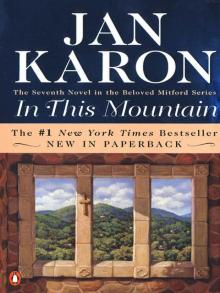 In This Mountain
In This Mountain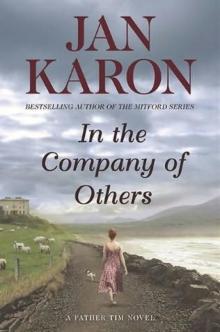 In the Company of Others
In the Company of Others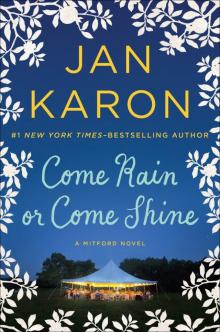 Come Rain or Come Shine
Come Rain or Come Shine To Be Where You Are
To Be Where You Are These High, Green Hills
These High, Green Hills Light From Heaven
Light From Heaven A New Song
A New Song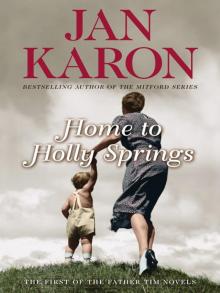 Home to Holly Springs
Home to Holly Springs The Mitford Bedside Companion
The Mitford Bedside Companion At Home in Mitford
At Home in Mitford Shepherds Abiding
Shepherds Abiding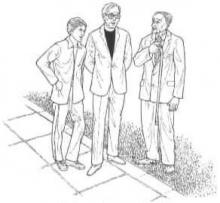 Out to Canaan
Out to Canaan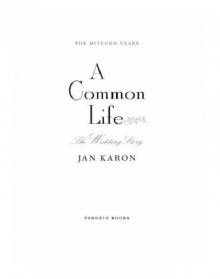 A Common Life: The Wedding Story
A Common Life: The Wedding Story Jan Karon's Mitford Years
Jan Karon's Mitford Years